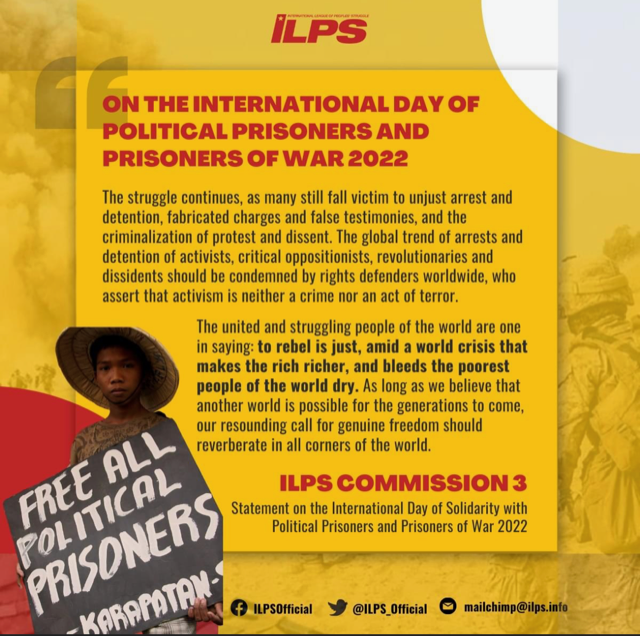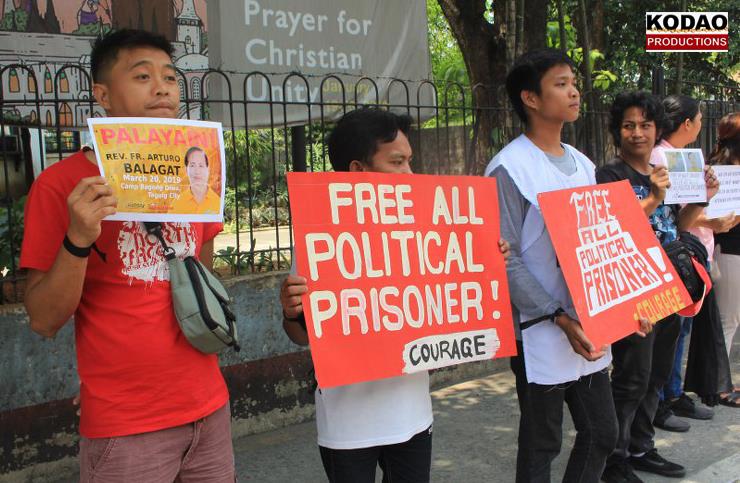
KAPATID Press Release | December 3, 2022
On the International Day of Solidarity with Political Prisoners, detained consultants of the National Democratic Front of the Philippines (NDFP) rapped the “illegitimate” Marcos government for implementing the same policies of the Duterte government that have worsened people’s lives as well as the critical congestion of Philippine jails and consequent “overcongestion of court cases.”
The commemoration of the International Day of Solidarity with Political Prisoners and Prisoners of War stemmed from the declaration of the International League of People’s Struggles (ILPS) in 2004 to mark every third of December as a day of global action to protest the plight of political prisoners in various countries.
Jailed NDFP peace consultants Rey Casambre, Frank Fernandez, Reynante Gamara, Vicente Ladlad and Adelberto Silva led the political prisoners who signed the statement that expressed solidarity with other political prisoners in the Philippines and abroad. The four are held at the Metro Manila District Jail Annex 4 in Camp Bagong Diwa in Bicutan, Taguig. They were among the peace negotiators ordered arrested after Duterte scuttled peace talks with the NDFP in 2017.
“The recently installed but illegitimate Marcos Jr. government continues to implement the same repressive and fascist policies and practice of the previous regime, as well as the same anti-people and anti-national social and economic programs that have wreaked havoc on our people’s lives and pushed them to further resistance,” said the political prisoners.

“State security forces continue to perpetrate with impunity extrajudicial killings, torture, forced disappearances, illegal arrests and detention based on trumped-up charges. The reactionary government continues to callously and shamelessly deny all these publicly, just as it denies the existence of political prisoners and the longstanding policy and practice of criminalizing political offenses,” they stressed.
But the political prisoners noted that “as clearly manifested in the recent UN Human Rights Council (UNHRC) fourth cycle of the Universal Periodic Review on the Philippines, many countries did not take the GRP report at face value.”
These countries instead “expressed their concern over the government’s human rights violations and inadequate measures and responses to previous UNHRC recommendations such as to stop extrajudicial killings, exact accountability on state perpetrators, and protect human rights defenders, indigenous peoples, lawyers and judges, environmentalists and journalists.”
The statement also pointed out that “the rampant, haphazard and indiscriminate arrests, both for reasons political and non-political, especially drug campaign related, has brought about the critical congestion of Philippine jails, one of the worst in the world with at least 2,000% overcapacity in Metro Manila jails by some conservative estimates.”
This, they noted, has resulted “in massive overloads or overcongestion of court cases. Some Metro Manila courts report that they handle 1,000 to 2,000 cases at a time. Consequently it is common for an accused not to have a single court hearing for nearly an entire year. The detainees not only suffer inhumane living conditions, they suffer these for an unjustly and unreasonably extended period of time.”
